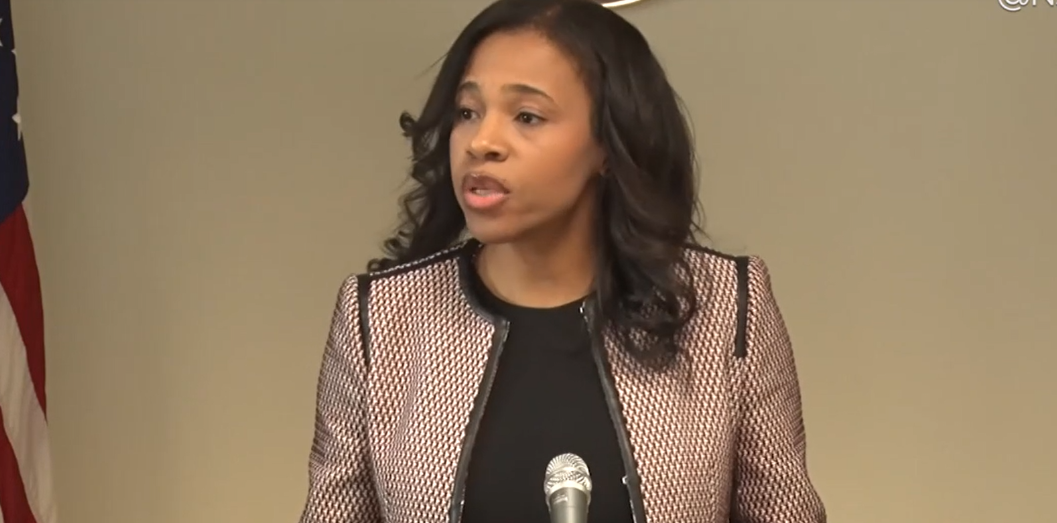
Initiative Aimed at Preventing AI-Generated Photos, Videos, & Audios from Maliciously Interfering in New Jersey Electoral Process
With the presidential election approaching, Lieutenant Governor Tahesha Way (in her capacity as Secretary of State) and Attorney General Matthew J. Platkin today issued guidance to help New Jersey residents identify and avoid spreading deepfake photos, videos, and audio that use generative AI technologies to spread misinformation aimed at manipulating and misleading voters.
Deepfakes are fake or manipulated photos, videos, or audio that appear real, but do not represent actual events. Created using generative AI technologies, deepfakes can appear in social media posts, text messages, emails, phone calls, or voicemails as part of a broader threat of false information designed to mislead and confuse the public.
To prevent AI-generated technology from maliciously interfering with the upcoming presidential election, Lt. Governor Way and Attorney General Platkin are raising public awareness of how deepfakes can be used to spread false or misleading information about candidates, political parties, and the voting process itself, including where to vote, or even who has the right to vote. The guidance also educates voters on how to spot and avoid spreading deepfakes, and where to report them.
“Free and fair elections are the cornerstone of our democracy and preserving the integrity of that process is paramount,” said Attorney General Platkin. “By raising the public’s awareness of political deepfakes, we are minimizing this potential threat to our electoral process and providing New Jersey voters with critical tools to help them cast their ballot with confidence.”
“As the 2024 Presidential Election approaches, it is more crucial than ever to protect our electoral process from the growing threats of mis-, dis-, and mal-information,” said Lieutenant Governor Way, who serves as New Jersey’s chief election official in her capacity as Secretary of State. “Generative AI has made it easier to produce political deepfakes—whether through manipulated images, videos, or voices—that mislead and deceive voters. This initiative is a vital step in helping voters recognize these tactics and ensuring the integrity of our free and fair elections.”
Protecting New Jersey residents from the potential harms of political deepfakes is the latest effort by AG Platkin and Lt. Governor Way to preserve the integrity of New Jersey’s electoral process and ensure that every eligible voter in the state has the opportunity to exercise their constitutional right to participate in a free, fair, and secure democratic process.
Other initiatives include:
· Vote.NJ.gov, the State’s official voter information site maintained by the Division of Elections, which serves as a comprehensive resource for those seeking to register and participate in New Jersey’s elections;
· a Voter Protection initiative to focus on identifying and addressing any voting rights or civil rights violations that may arise during either early voting or Election Day;
· a Voting Rights Resources webpage that serves as a go-to guide for New Jersey residents, answering frequently asked questions about voting rights and providing a platform for voters to report any issues they encounter during the voting process;
· a Trusted Sources campaign being launched by the Secretary of State’s Office to help the public recognize and rely on verified sources of election information in New Jersey. The campaign’s first release will be an infographic highlighting key trusted sources, including the Secretary of State, Division of Elections, and County Election Officials. It will equip voters with tools to ensure the accuracy of election-related information and helps combat the spread of mis-, dis-, and mal-information. The Trusted Sources infographic and additional information will be available at vote.nj.gov.
New Jersey voters are urged to report potential election-related deepfakes to [email protected].
With the upcoming election season fast approaching, the issue of political ‘deepfakes’ has become a growing concern among voters and politicians alike. Deepfakes are highly realistic videos or audio recordings that have been manipulated or created using artificial intelligence technology to deceive viewers into believing false information.
To help voters navigate the murky waters of deepfakes, political analysts Way and Platkin have shared their insights on how to identify these deceptive videos before the election. By being vigilant and informed, voters can protect themselves from falling prey to misinformation and manipulation.
One key tip from Way and Platkin is to pay attention to the source of the video. Deepfakes are often created by malicious actors or foreign entities with the intent to spread disinformation and sow discord. By verifying the credibility of the source, voters can better assess the authenticity of the video and determine if it is trustworthy.
Another important factor to consider is the context of the video. Deepfakes are often used to distort reality and mislead viewers into believing false information. By critically analyzing the content of the video and fact-checking any claims made, voters can better discern the truth and make informed decisions at the polls.
Additionally, Way and Platkin recommend looking for inconsistencies in the video, such as unnatural movements or audio discrepancies. Deepfakes are created using sophisticated technology, but they are not perfect and may contain subtle clues that reveal their true nature. By scrutinizing the details of the video, voters can spot potential red flags and avoid falling for deceptive tactics.
In conclusion, as the election season heats up, it is more important than ever for voters to be vigilant and informed about the threat of political deepfakes. By following the insights from Way and Platkin, voters can protect themselves from falling victim to misinformation and manipulation. By staying informed and critical, voters can ensure that their voices are heard and their votes are cast based on truth and integrity.
